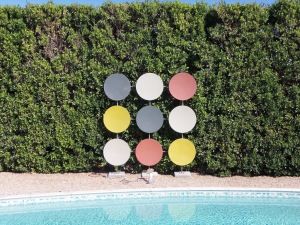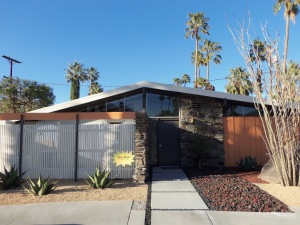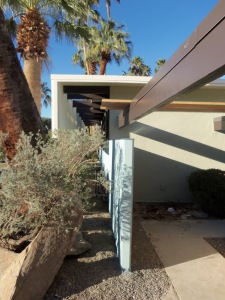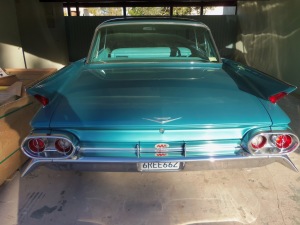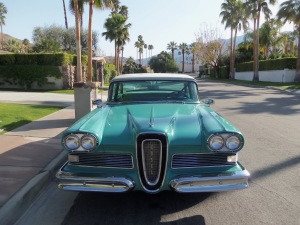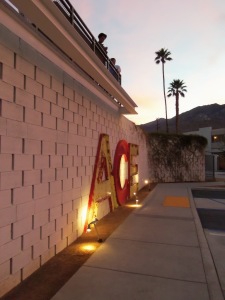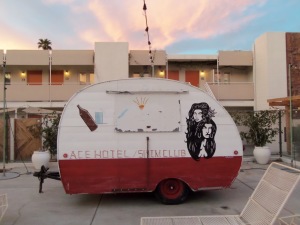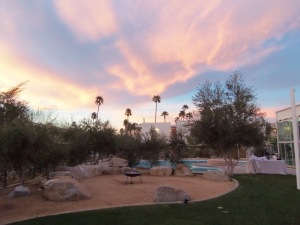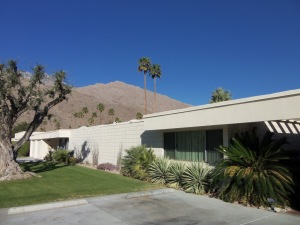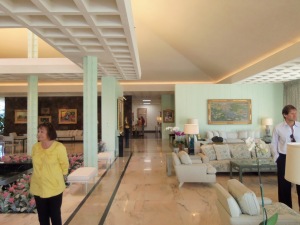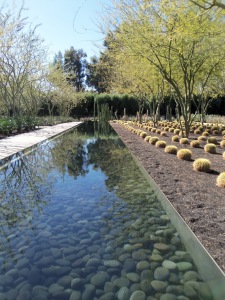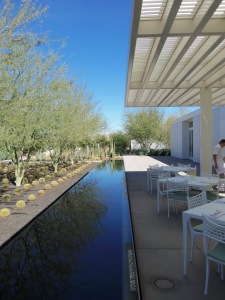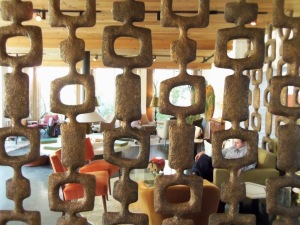Modernism may have saved Palm Springs. Well, modernism embraced by a lot of gay folk. This turn of events is a victory for those of us queer Baby Boomers who endured so much bullying and also loved the modern buildings that went up during our lifetime. A bittersweet victory if you will or may be I am just be nostalgic for lost glamour. But I like Palm Springs because it has civic pride, vibrancy, and some coherent design, and everybody is on vacation all the time!
Since modern Palm Springs was connected to Hollywood, the architecture there often had some excess or at least an extra fillip. Look at the Alexander homes as compared to the Eichlers. Their angles and eaves are just a little more exaggerated, a little more dramatic. You could call it the Googie influence.
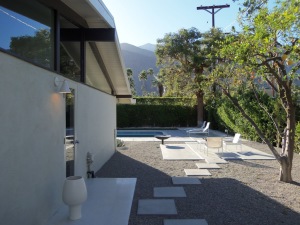 |
| A few Alexanders in Twin Palms |
As gay men collect these modern houses and repair them, they also seem to be collecting vintage cars. It’s no mistake that a car auction was going on at the conclusion of Modernism Week. Drive around the Alexander subdivisions and you will see some 1950s and 60s classic cars parked in the driveway. Palm Springs is fast becoming home to what I call “Tailfin Modernism.”
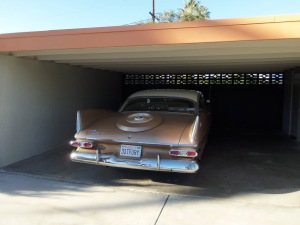 |
| The tailfin autos serve as a symbol of the era in Palm Springs. |
This isn’t the taut modernism of Mies (or his LA disciple Craig Ellwood), this is a modernism intended for the middle class and brought to fruition in tract homes, coffee shops, and hotels. An architect friend of mine suggested that these Alexander tracts sprinkled throughout a variety of Palm Springs neighborhoods might have led to the town’s demise as well as its revitalization. Palm Springs had been the exclusive getaway for Hollywood royalty, and the introduction of the middle class to neighborhoods like Las Palmas pushed the elites down the valley to Rancho Mirage and Palm Desert. Better stores such as I. Magnin, Saks, and Bullocks Wilshire followed them. Eventually, with articles about Palm Springs in magazines like the New Yorker, and an early biography of Albert Frey by Joe Rosa, the city got back on the map, and gay men from LA seeking weekend homes bought up these very same Alexanders for little money and refurbished them, often improving on their modest bones. Now even a new KFC took its cue from Albert Frey’s Tramway gas station.
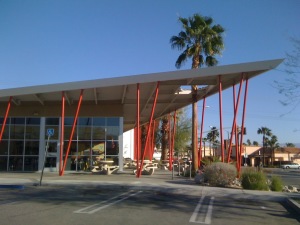 |
| The new KFC refers to Frey’s Tramway gas station. |
In the wake of gay revitalization followed the successful cultural tourism program called Modernism Week (now more like Modernism Week and a half). The program’s organizers are happy to celebrate a broad range of mid-century structures. This year, the highlight was the preopening tours of the famed Annenberg Estate, Sunnylands, by architect A. Quincy Jones, decorators Billy Haines and Ted Graber, and others. There was also a serious symposium with talks by historians, architects, and landscape architects about the history and restoration of Sunnylands and the legacy of Jones. (I’m working on a longer article about this for the Architect’s Newspaper.) At the other end of the spectrum was a bizarre presentation at the Ace Hotel of mermaids and their cocktail lounges, including a demonstration by a mermaid in one of the pools. The wonderful mix of programs and tours fills up shortly after they’re announced around Labor Day—as do the hotels and vacation rentals.
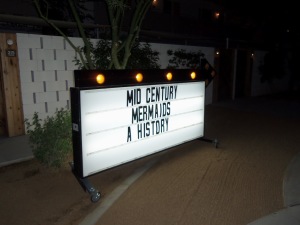 |
| Even mermaids go mid-century during Modernism week. |
Speaking of the Ace, those hospitality folks who specialize in turning around run-down properties took an unremarkable Howard Johnson and turned it into something quite festive. The big surprise was how many tattooed hipsters have kids! The service is sometimes indifferent, sometimes cheerful. The food in the remodeled Denny’s is pretty good. The macramé elephant is the coup de grace.
What is amazing about Palm Springs is how many of the modern landmarks are not hidden behind enormous hedges or gates. From the street, you can see portions of Neutra’s Kauffmann house, Williams’s Edris house, Ellwood’s Pavelsky house, and Wexler’s steel houses.
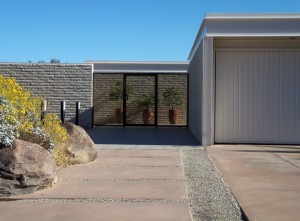 |
| Palevsky House by Craig Ellwood |
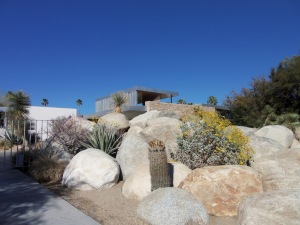 |
| Kaufmann House by Richard Neutra |
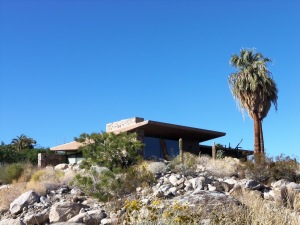 |
| Edris House by E. Stewart Williams |
On the south side of Palm Springs, there isn’t much of a fine-grain “urban fabric,” but many of the modern condos are not hidden behind gates, although the grounds are private. Two worth checking out are Country Club Estates by A. Quincy Jones on La Verne Way and the more fanciful Royal Hawaiian Estates by Wexler and Harrison near the Ace. Quincy’s little concrete block buildings look rather like the guest houses at Sunnylands.
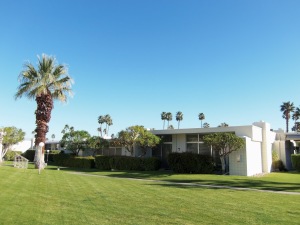 |
| Country Club Estates by A. Quincy Jones. Other than the color they look like the guest houses at Sunnylands. |
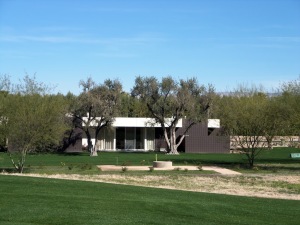 |
| Annenberg guest house looks like a darker version of the Country Club Estates |
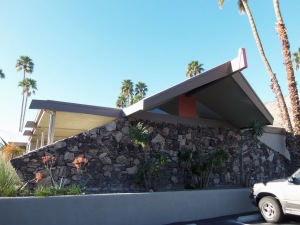 |
| Royal Hawaiian Estates by Wexler and Harrison |
In town along Palm Canyon Drive, there is a lot more foot traffic than there was ten years ago. The new Lulu restaurant, with its outdoor patio open to the passing parade of the street, was packed. More good news on Palm Canyon Drive was announced at Modernism Week. The Palm Springs Art Museum has taken over the Santa Fe Federal Savings and Loan building that E. Stewart Williams designed. Marmol Radziner (the architects who restored the Kaufmann house for Brent Harris and Beth Edwards Harris) will renovate the building into the Edwards Harris Center for Architecture and Design. This means more pedestrian traffic on the street, more awareness of the Palm Springs modern legacy, and one more rescued bank building (Palm Springs has an amazing collection of mid-century banks).
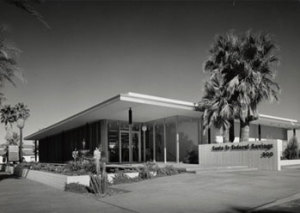 |
| Santa Fe Federal Savings & Loan, 1960 courtesy psmuseum.org |
On the not-so-good downtown news front, rumors are that the Desert Fashion Plaza won’t be modern after all but more Spanish Med dreck. The renderings on the developer’s website are so small as to be unreadable. The idea of a standard shopping mall turning its back on the street was always a dumb idea, and the building has been vacant forever. It’s hard to think of a retail strategy that would work here. Big boxes are at the edge of town, and high-end retail decamped for Palm Desert years ago. A voter approved sales tax increase is going to help pay for this redevelopment so I hope it looks forward and not backward. Might be time to occupy Palm Canyon Drive!
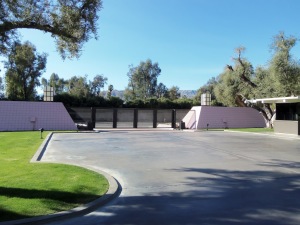 |
| Entry gate to Sunnylands on Frank Sinatra drive |
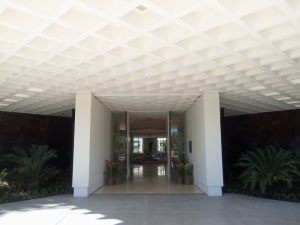 |
| The canopy and front doors. |
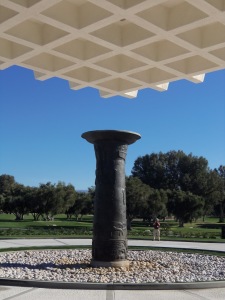 |
|
Canopy looking toward front drive.
|
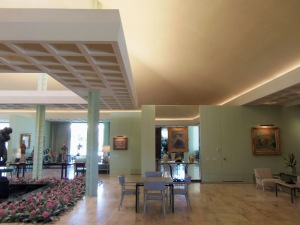 |
| The main living space with the Billy Haines/Ted Graber interior. |
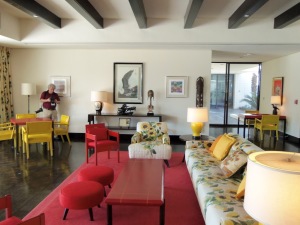 |
| The game room in the guest wing. |
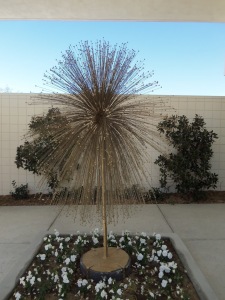 |
| Bertoia sculpture outside the dining room |
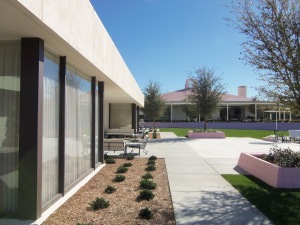 |
| The guest wing looking towards the main house. |
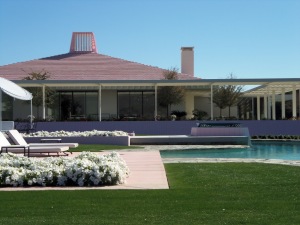 |
| The main house. |
The best news for modernist fans of all stripes is the reopening of Sunnylands in Rancho Mirage. In 1963, media billionaire Walter Annenberg and his wife Leonore commissioned what is essentially a one-bedroom 20,000-foot house with a 200-acre golf course. In March of 1966, they welcomed President Dwight Eisenhower as their first guest. After the deaths of the Annenbergs in the 2000s, the home was to be turned into a retreat center, primarily for small groups of people trying to tackle large problems, although also open by reservation to the public. Compared to Downton Abbey, the place is informal. But compared to how most of us live, it is still spellbinding and stiff. A. Quincy Jones was able to deliver a very grand space for socializing and smaller-scaled spaces for intimate gatherings. This is probably the grandest example ever built of high Hollywood Regency combined with sprawling California modern ranch. The weird juxtaposition of styles was popular with movie moguls and tycoons in Southern California. Anybody interested in the influence of California culture, especially the Reagan Republican kind, will want to check it out. I think of it as San Simeon for the jet age. Tour tickets for the estate are released in two-week increments on the 1st and 15th of each month and cost $35 each.
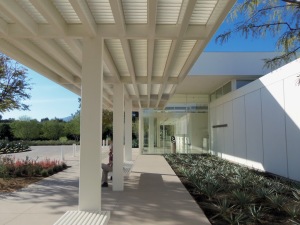 |
| Fisher’s trellis relates to the trellis outside the house at Sunnylands. |
 |
| New garden was by the Office of James Burnett was inspired by the Annenberg’s impressionist collection. |
The Sunnylands visitor’s center by Frederick Fisher and Partners with gardens by the Office of James Burnett will appeal to design types as well as the white-trouser yellow-golf-shirt crowd. Fisher reflects on Jones’s modernism in a comfortable but modest pavilion in the desert landscape. The trails on the 15 acres will make for a healthy 1.25-mile walk. Sustainability was key in the development of the complex, which has been certified LEED Gold by the USGBC. The visitor’s center and garden will be open to the public free of charge. There is also a modest café and gift shop.
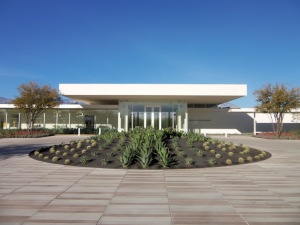 |
| New Visitor Center by Fred Fisher and Partners |
On the way back to Palm Springs from Rancho Mirage, there is fun group of stores in the most unlikely place—a row of tilt-up warehouses on Perez Road in Cathedral City. My favorite of the group is Hedge, because it had so many things I would buy if I owned a house in Palm Springs, and because the two guys who run it are funny and hospitable. Elsewhere in the center is a beautifully curated shop called Colin Fisher Studios. In between, you can see Danish modern and a few stores stuffed to the brim with who knows what. Well worth a detour.
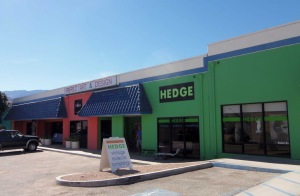 |
| Hedge in a tilt-up in Cathedral City has some great mid-century decor. |
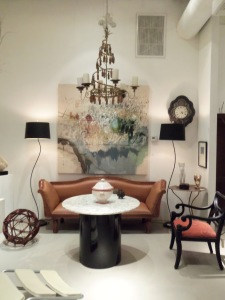 |
| Colin Fisher Studios in the same complex is even more curated. |
If you are looking to spend too much for a simple lunch in a lovely setting, drive up to the Parker Palm Springs, give your car away to the valet, and walk through 20-foot tall doors. Jonathan Adler has taken the thrift store aesthetic to new heights at the former Merv Griffin/Givenchy/Gene Autry hotel. The complex’s Frenchified portions from the Givenchy era have been thankfully covered by plantings and accessorized by Adler’s Blenko glass aesthetic. Weirdly enough, it works. But the highlight here is the grounds, which are wonderfully overgrown and mysterious. If you are too old or not tattooed enough for the Ace, this is a good alternative.
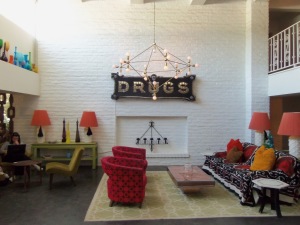 |
| The mid-century thrift store aesthetic reaches new heights at the Parker Palm Springs. |
See you next year at Modernism Week, which will be held February 14 to 24. Perhaps by then I will have my dream car from the 60s. Less fin, more substance, please. I figure if Jessica Mitford could have one, I can too!
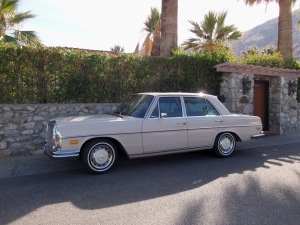 |
| My preferred finless transport from the ’60s. |
Special thanks to architect Ken Lyon for driving me around to so many of these highlights!
For further information:
Sunnylands Center & Gardens
www.sunnylands.org
The Palm Springs Modern Committee
http://psmodcom.org
Modernism Week
http://www.modernismweek.com
Palms Springs Art Museum
www.psmuseum.org
Hedge
www.hedgepalmsprings.com
